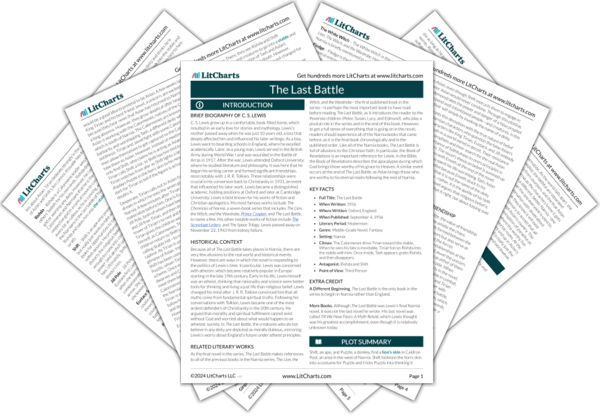Throughout the novel, the stable’s symbolic role fluctuates, as it begins as a site of deception but eventually transforms into one of divine redemption. Initially, the stable appears to be a simple wooden structure, insignificant except that Shift claims that Aslan is sitting inside. Notably, in the Christian tradition, Jesus Christ is born in a stable, so the use of a stable here fits with the novel’s reliance on Christian imagery. However, although Shift claims the stable is a religious site, he is lying. As such, the stable becomes a perversion of religious belief and ceremony, as Shift parades Puzzle around at night, claiming the donkey is Aslan. Then, when Rishda takes charge, the stable becomes a sight of fear and violence, as Tash begins taking revenge on everyone who falsely claimed that he and Aslan are one in the same. Still, in the final chapters of the novel, the stable becomes a holy site after all because Aslan transforms it into a portal leading to eternal paradise for the worthy. The ultimate fate of the stable aligns with the Christian belief that the greatness of God will always triumph over evil, as Aslan’s glory transforms the profane into the sacred.
The Stable Quotes in The Last Battle
“Nay, my Father,” answered Emeth. “Thou hast said that their Aslan and our Tash are all one. And if that is the truth, then Tash himself is in yonder. And how then sayest thou that I have nothing to do with him? For gladly would I die a thousand deaths if I might look once on the face of Tash.”

Unlock explanations and citation info for this and every other The Last Battle quote.
Plus so much more...
Get LitCharts A+But Tirian gazed round and saw how very few of the animals had moved.
“To me! to me!” he called. “Have you all turned cowards since I was your King?”
“We daren’t,” whimpered dozens of voices. “Tashlan would be angry. Shield us from Tashlan.”
Seven Kings and Queens stood before him, all with crowns on their heads and all in glittering clothes, but the Kings wore fine mail as well and had their swords drawn in their hands. Tirian bowed courteously and was about to speak when the youngest of the Queens laughed. He stared hard at her face, and then gasped with amazement, for he knew her. It was Jill: but not Jill as he had last seen her, with her face all dirt and tears and an old drill dress half slipping off one shoulder. Now she looked cool and fresh, as fresh as if she had just come from bathing. And at first he thought she looked older, but then didn’t, and he could never make up his mind on that point. And then he saw that the youngest of the Kings was Eustace: but he also was changed as Jill was changed.
But very soon every Dwarf began suspecting that every other Dwarf had found something nicer than he had, and they started grabbing and snatching, and went on to quarreling, till in a few minutes there was a free fight and all the good food was smeared on their faces and clothes or trodden under foot. “But when at last they sat down to nurse their black eyes and their bleeding noses, they all said:
“Well, at any rate there’s no Humbug here. We haven’t let anyone take us in. The Dwarfs are for the Dwarfs.”
“You see,” said Aslan. “They will not let us help them. They have chosen cunning instead of belief. Their prison is only in their own minds, yet they are in that prison; and so afraid of being taken in that they cannot be taken out. But come, children. I have other work to do.”












